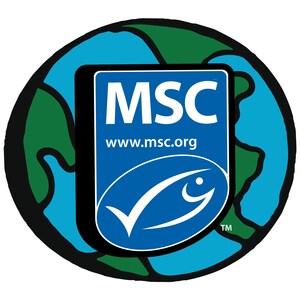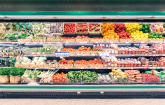"Good Catch!" Campaign Bolsters New England's Sustainable Seafood Businesses
MSC Works with Fisheries, Retailers to Assure Seafood Supplies Are Safeguarded
BOSTON, Aug. 9, 2016 /PRNewswire/ -- According to new independent research, seafood consumers in New England are significantly more likely than national consumers to purchase fresh fish at a seafood counter, 58 percent and 40 percent, respectively1. New England consumers' affinity for fresh seafood is renowned, and the region benefits from a concentration of certified sustainable fisheries, which work to protect fish stocks, ecosystems and local fishing communities. However, consumer awareness of the abundant sustainable seafood offerings from area sellers remains low. To address this, the Marine Stewardship Council (MSC), an international non-profit dedicated to safeguarding the seafood supply, will launch a campaign to educate New England consumers about identifying sustainable seafood products.
MSC will take its "Good Catch!" campaign directly to consumers this month with events at Whole Foods and Big Y grocery stores, which feature MSC at their fresh fish counters, in greater Boston, Springfield and Great Barrington, as well as at Green Fest and the Quincy Farmers Market.
"As consumers are developing greater awareness of their impact on the world, they are demanding more ways to validate that the products they buy support their values," said Brian Perkins, MSC Regional Director - Americas. "You should have confidence that what you are buying really is what it says it is and that it originates from a sustainable source. The blue MSC label ensures that the seafood was caught wild, using methods that don't deplete the natural supply or come at the expense of other ocean life."
IMPACT ON LOCAL FISHING INDUSTRY: The fishing industry – at the heart of many New England communities – has seen first-hand the consequences of unsustainable fishing. Sustainable fisheries in New England, and globally, are the most important players in addressing these problems. The MSC certification program helps these fishing communities prove to the marketplace that their seafood supplies are healthy. In New England, the US Atlantic sea scallop; Maine Lobster; US North Atlantic swordfish; US Atlantic spiny dogfish; US Acadian, redfish, pollock and haddock fisheries are MSC certified.
"The fishing industry is vital to New England's economy, and operating them sustainably ensures that our industry will continue for generations to come," said Doug Feeney a commercial fisherman and member of the Cape Cod Fisherman's Association. "Consumers want to know that the seafood they buy is responsibly sourced – MSC certification allows us to let local shoppers know that what they're buying really does come from our sustainable sources."
Consumers wishing to learn more about sustainable seafood can look for the MSC booth throughout August outside Whole Foods stores in the Boston area, Big Y stores in Springfield and Great Barrington, Green Fest, and the Quincy Farmers Market. Visit msc.org/goodcatch for information.
"By purchasing seafood that they know comes from a sustainable source, consumers help protect our oceans and ensure that seafood can be enjoyed for many generations to come," said Perkins. "They have the power to impact the health of the ocean and the continuation of the fishing industry simply by the products they choose."
About the Marine Stewardship Council (MSC): The Marine Stewardship Council (MSC) is an international non-profit organization. Our vision is for the world's oceans to be teeming with life, and seafood supplies safeguarded for this and future generations. Our ecolabel and certification program recognizes and rewards sustainable fishing practices and is helping create a more sustainable seafood market. The MSC ecolabel on a seafood product means that it comes from a wild-catch fishery which has been independently certified to the MSC's science-based standard for environmentally sustainable fishing, and it's fully traceable to a sustainable source. More than 280 fisheries in over 35 countries are certified to the MSC's Standard. These fisheries have a combined annual seafood production of almost nine million metric tons, representing close to 10% of annual global yields. More than 20,000 seafood products worldwide carry the MSC ecolabel. For more information, visit www.msc.org.
Visit our social media pages:
https://www.facebook.com/mscintheusa
https://www.linkedin.com/company/marine-stewardship-council
https://twitter.com/MSCecolabel
https://www.youtube.com/user/sustainableseafood
1 MSC Consumer Perceptions Survey 2016, https://www.msc.org/newsroom/news/seafood-consumers-put-sustainability-before-price-and-brand
Video - http://youtu.be/FehP5TNVV8g
SOURCE Marine Stewardship Council
Related Links
WANT YOUR COMPANY'S NEWS FEATURED ON PRNEWSWIRE.COM?
Newsrooms &
Influencers
Digital Media
Outlets
Journalists
Opted In





Share this article